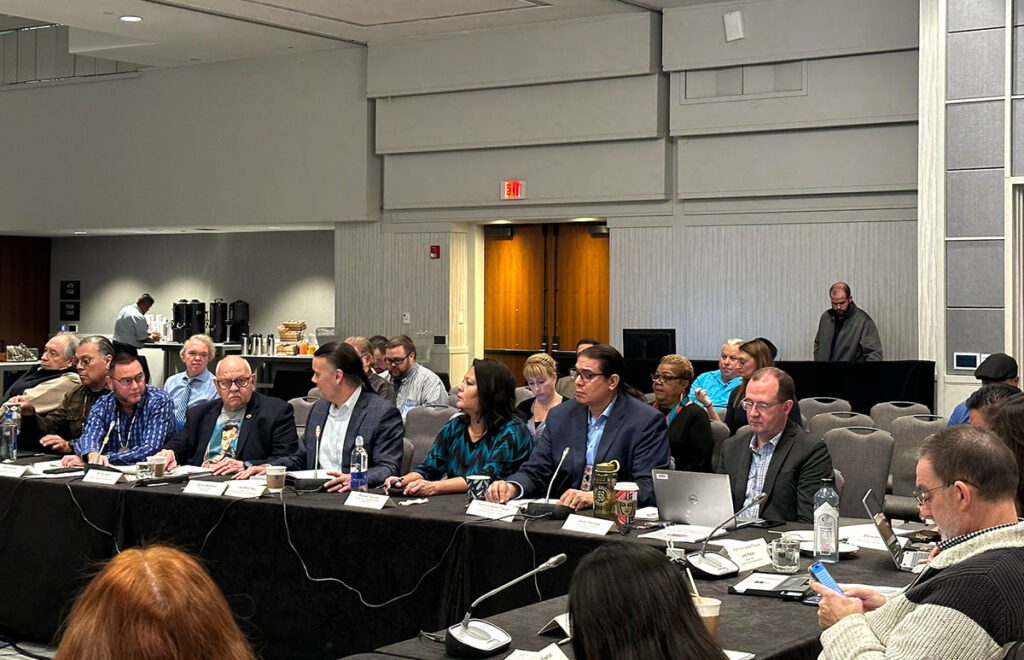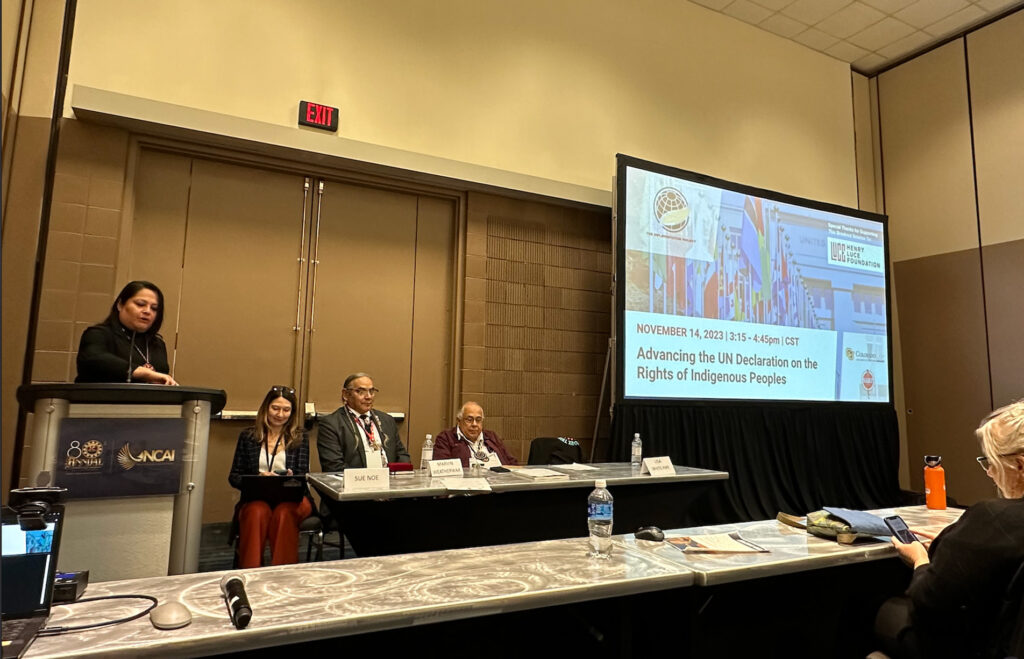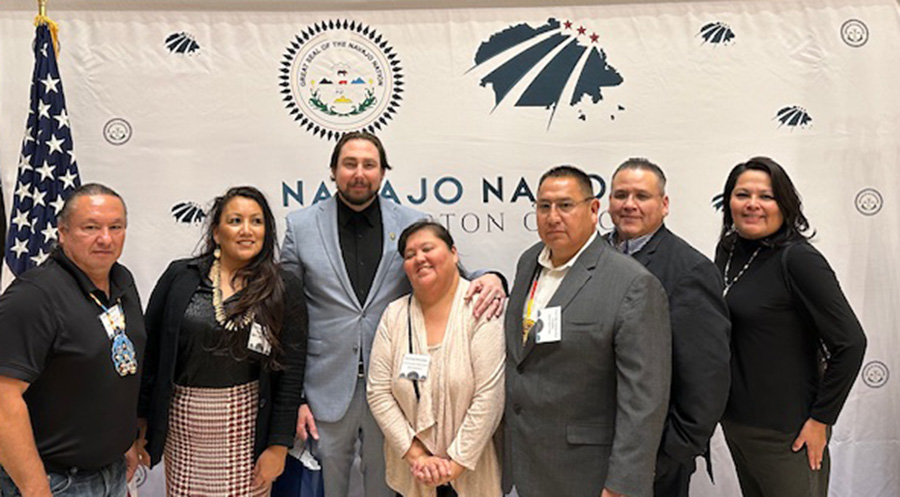TIBC Co-Chair and COLT Treasurer Lisa White Pipe, shown at right, in Washington D.C.
This week in Washington D.C. the Tribal Interior Budget Council meeting was held and TIBC Co-Chair and COLT Treasurer Lisa White Pipe gave the opening remarks, advocating for all COLT member Tribes.
During the week White Pipe also nominated Navajo Nation Council Delegate Eugenia Charles-Newton, who is currently a TIBC Public Safety Subcommittee Co-Chair, to serve a three-year term as a TIBC Co-Chair. Chairman Ron Allen was also nominated for another term.
Meeting materials from the TIBC can be found at on the National Congress of American Indians website.

Lisa White Pipe’s Opening Remarks
Lakota Introduction:
My name is Lisa White Pipe and I am a Council representative for the Rosebud Sioux Tribe, the Great Plains Region, and the Treasurer of the Coalition of Large Tribes.
I want to welcome all the Tribal Leaders and members to the Tribal Interior Budget Council meeting. I am honored to sit here today as a Co-Chair, and I want to thank each one of you for taking the time away from your families and many responsibilities for your tribal communities to be here for this important meeting.
As you are aware, the Tribal Interior Budget Council provides a forum and process for tribes and Federal officials to work together in developing annual budget requests for Indian programs in the U.S. Department of the Interior, the primary federal agency (in addition to the IHS) of the United States’ solemn Treaty promises and Trust responsibilities. The work we do with Interior informs the rest of the Administration as well and our discussions here in TIBC provide the budget foundation for helping all of our people not only survive, but thrive.
The Biden-Harris Campaign offered a bold vision for Indian Country, promising to:
Ensure fulfillment of federal trust and treaty obligations including by working to address chronic underfunding of unmet federal obligations to Indian Country.
As we discuss the budget process and requests, I want to remind the Bureau of Indian Affairs and Bureau of Indian Education’s and the overall United States Government of this Administration’s vision, and its Treaty obligations to the Tribes here today. The funding requests we will be discussing are not just data points, budget numbers, or talking points but touch upon the real life and death issues of our Tribal communities.
As an example, on December 12th, 2022, the Rosebud Sioux Tribe was hit with a devastating snowstorm. Because of the formulas used by the Bureau of Indian Affairs at DOI and FEMA and approved by Congress, we did not have enough resources, including snow removal equipment, and what we did have broke down almost immediately. Tribes in South Dakota faced this storm with outdated equipment and dilapidated resources. We lost 6 tribal members during that storm, the youngest being 12 years old. As I said, these budgets truly affect the lives of our people.
Although I am using the Rosebud Sioux Tribe as an example, what I am telling you is true for all Large Land Base Tribes.
The Bureau of Indian Affairs’ own information shows that in order for Tribes and/or the Bureau to provide law enforcement services we need 2.8 billion dollars in our budget and yet we only see a small fraction of funding needed for police officers to cover millions of acres, with no direct correlation to the population and land served.
The Tribal leaders here from Large Land Base Tribes, like mine, are focused on our peoples’ needs for health and wellness, including addressing our areas of deepest historic inequity — (1) adequate funding for law enforcement and public safety, including tribal courts, to address the MMIP crisis and the constant presence of cartels and traffickers; (2) basic dollars for transportation and maintenance to address the often outdaded reservation roads and equipment that endanger emergency responders and our citizens; and (3) funding to support our reacquisition and consolidation of our land base (including land holding past boarding schools), which is at the center of our identity and culture. Each of these priority areas is routinely weighed against tribes with much more resources and often is underfunded. We want to see an actual assessment of Tribes’ needs and budgets that match those needs.
Additionally, we need direct meetings with top leadership at OMB to be effective. Appearances from Director Young are appreciated as well as the tribal designee, Liz Carr, but it is not enough. We need to meet with top leadership and have her hear us. We also need Attorney General Garland to meet with us. DOJ’s persistent anti-Tribal posture in Treaty rights cases is especially troubling and their positions in cases are often in direct conflict with our desire to provide public safety. These leaders need to sit across the table from us and be part of the solutions. We also ask to meet with Principal Deputy Assistant Secretary (Acting AS) Joan Mooney. We need PMB’s leadership and decision making authority for Tribes to see and hear.
And we also need to make sure that our partners in Indian Affairs and BIE have mandatory and advance Appropriations so that our services to citizens and our children are not left in limbo by budget dysfunction here in Washington, DC.
We need to reconsider our approach to TIBC. We need a Protocol and procedures that actually work to get as many Tribal voices heard as possible. The TIBC process should be more inclusive and have equitable participation, including making sure TIBC proceedings are always online so that future leaders at home can watch and learn, and that materials are timely posted well in advance of the meetings. The lack of timely notices, postings, or online access to our Subcommittee meetings this week has been very disappointing. TIBC should be providing constant orientation, education and information so that Tribal leaders can continue to learn the process and better represent their people in this most essential budget meeting. What we do here are matters of life and death for people and we should not elevate form and habit over substance and function.
I have given these remarks before and I will keep giving them until we realize change.
Lastly, I want to thank Assistant Secretary Newland and Deputy Assistant Secretary-Management Jason Freihage for responding swiftly to the Coalition of Large Tribes’ request to direct support and additional staffing to get FY 2022 and 2023 monies out to tribes in advance of any government shutdown. We appreciate your efforts and responsiveness. Having the monies might on hand for an extended shutdown saves us from having to continue to burden our General Funds as we wait for the pre-paid land cession dollars promised to us by all of our ancestors.
Thank you for your time listening to me and I am honored that we will be working together to help our people.
TIBC Co-Chair and COLT Treasurer Lisa White Pipe


